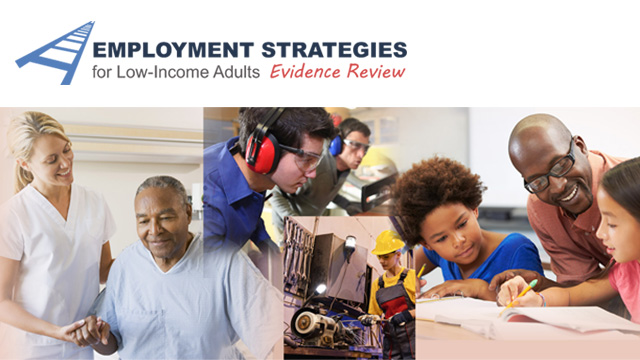 Policymakers, program administrators, and employers all have an interest in understanding the relationship between employment and health. A strong evidence base suggests there is a link between work and good health, but understanding the extent and nature of the relationship remains a challenge, especially for low-income adults and their children.
Policymakers, program administrators, and employers all have an interest in understanding the relationship between employment and health. A strong evidence base suggests there is a link between work and good health, but understanding the extent and nature of the relationship remains a challenge, especially for low-income adults and their children.
A new literature review, part of the Employment Strategies for Low-Income Adults Evidence Review (ESER), distills findings from a large body of research and attempts to draw evidence-based conclusions about the causal relationship between employment and health for low-income adults and their children. Specifically, the review examines research designed to test whether a change in employment is responsible for a change in health, or vice versa. The review also considers whether there is a causal relationship between work environment and health, as the nature and quality of a job can affect a person’s health.
The review found that significant gaps exist in our understanding of the relationship between health and work. The review showed several key findings:
- There has been little research on the causal relationship between employment and health among low-income Americans. Instead, the existing research is mostly correlational: it does not shed light on whether a change in employment is responsible for a change in health (or vice versa), because it cannot rule out the possibility that other factors actually caused the changes in both. Much of the existing research is also based outside of the United States and/or on a general population, and thus, its findings might not apply to low-income adults and families in the United States.
- Existing causal research typically does not directly test the effects of employment on health, or vice versa. Instead, most of the research conducted to date tests the impact of welfare-to-work programs, which offer a bundle of employment services, on health.
- On the whole, the studies reviewed suggest that although the welfare-to-work programs did help people find jobs, they did not affect mothers’ well-being or have lasting effects on their children’s development. There was some evidence, however, that health programs that provided case management can help people find jobs.
Although aspects of the work environment were correlated with health, there was little causal evidence about this relationship.
Although these findings rely on only a few studies, limiting the ability to draw definitive conclusions, they can help inform decisions about designing programs to improve health or employment outcomes for low-income adults and their dependent children. The review also lays the groundwork for a future research agenda.
Over the past 25 years, there has been a substantial amount of research on initiatives designed to help low-income adults find good jobs and increase their earnings. The Employment Strategies for Low-Income Adults Evidence Review (ESER) aims to make this research more accessible and easier to understand so that future efforts can build on the existing evidence. ESER is a systematic evidence review conducted by Mathematica and sponsored by the Office of Planning, Research & Evaluation within the Administration for Children & Families, U.S. Department of Health and Human Services. ESER reviewed studies about employment and training interventions for low-income adults published from 1990 to mid-2014.
The Office of Planning, Research & Evaluation in the Administration for Children & Families sponsored this systematic review on the effects of employment and training programs and strategies for low-income adults. It aims to help identify programs and services that promote employment and job retention.
Also from ESER
- Gaps in the Evidence on Employment and Training for Low-Income Adults describes limitations of both the interventions studied and of the studies themselves.
- Assessing the Evidence Base: Strategies That Support Employment for Low-Income Adults summarizes and highlights key findings of the review.
- Financial Incentives and Sanctions: Can They Improve Employment Outcomes for Low-Income Adults? describes the employment and earnings impacts of 12 interventions identified by ESER that used financial incentives or sanctions as a primary strategy.
- Work Readiness: Can It Lead to Better Employment and Earnings for Low-Income Adults? discusses interventions that used work readiness as a primary strategy and their impact on employment and earnings.
- Primary Employment and Training Strategies Used in the Interventions Reviewed by ESER describes the services, strategies, or approaches that studies of employment and training interventions have tested.
- ESER Reporting Guide for Study Authors recommends ways to describe and report research.
- The Right Tool for the Job: A Meta-Regression of Employment Strategies' Effects on Different Outcomes uses a rigorous analysis to assess which employment strategies worked best overall for achieving particular outcomes and for serving specific types of people.

